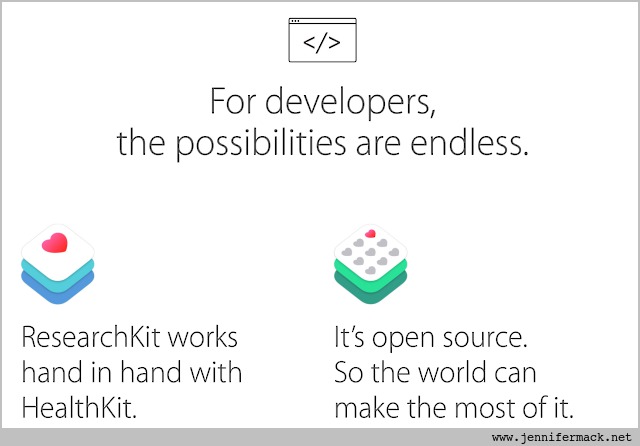Apple’s ResearchKit Breaks New Ground In Medical Research
Of of the things announced today, Apple’s ResearchKit strikes me as the one thing that will have a long-lasting impact on the world. I think Apple might realize it too. Making ResearchKit open source was a main point in the presentation.
Until now, taking part in a medical study has usually required traveling to a hospital or facility to complete tasks and fill out questionnaires. With ResearchKit, you can use your iPhone to perform activities and generate data wherever you are, providing a source of information that is more objective than ever possible before.
This is about actually getting data into the hands of researchers. Medical research is expensive. It involves paying people for participating in the study, and the time it takes for each consultation. Some researchers have turned to online platforms to find a population for the study. The downside of the is some people are participating just for the money. In some cases it has become a job. PBS recently produced a segment about these professional survey takers.
How much bogus data is generated by attracting people that just want to move onto the next survey and collect the fee. This is a boon for college students who need to collect data fast for a class assignment. With enough participants, the bad data could be averaged out. This works better for some fields of study than others. In psychology for example, the survey is the main data collection tool. Crowdsourcing lets the research get get done where otherwise it wouldn’t.
But what about medical research that needs a specific subset of the population?

Attracting these people can be quite difficult. In the Apple video one researcher commented about the poor response rate. The numbers she mentioned indicate a less than 1% response rate for signing up participants. The real world impact is that research is not getting done because the right people aren’t able to be part of a study.
Got disease? There’s an app for that.
It looks like Apple decided this was a communications problem that can be solved by connecting people to researchers. And from looking at the first research apps available, they’re onto something.
Two apps stood out: the ones for Parkinson’s Disease and Asthma.
The Parkinson’s app demonstration was simply stunning. First, having an objective measure of the severity of the disease will be data never before gathered. Second, the self-evaluation tests will let the patients be involved in their treatment like never before.
With the asthma app, researchers are able to correlate collected data from the environment to reported asthma systems. There was mention of some participants in NYC getting bluetooth-linked inhalers. That will give a real-time view of environmental conditions matched up with actual inhaler use. Imagine there is an event that effects air quality. The measurements of the air can be matched to asthma symptoms without relying on participants memory of the event.
The real-time feedback alone will change how researchers approach future studies. Another forgotten aspect will be the increased diversity of study participants. How many research papers are biased towards white males because that’s who joined a study on a college campus? The lack of gender specific research is slowly changing.
As recently as the early 2000s, some studies were close to women based on safety concerns. This also led to a lack of data about how medications worked on half the population. Funding also has followed this split. Studies that focus on men tend to get the most money.
Having a potential study population consisting of all iPhone owners is something that never been available before. The population will also be the most diverse that’s ever been available. If nothing else, this will improve the quality of the research overnight.
I’m sure Apple isn’t the first one to think having a portable data collector on a large group of participants. They just happen to be the one that has the platform to make it happen.
